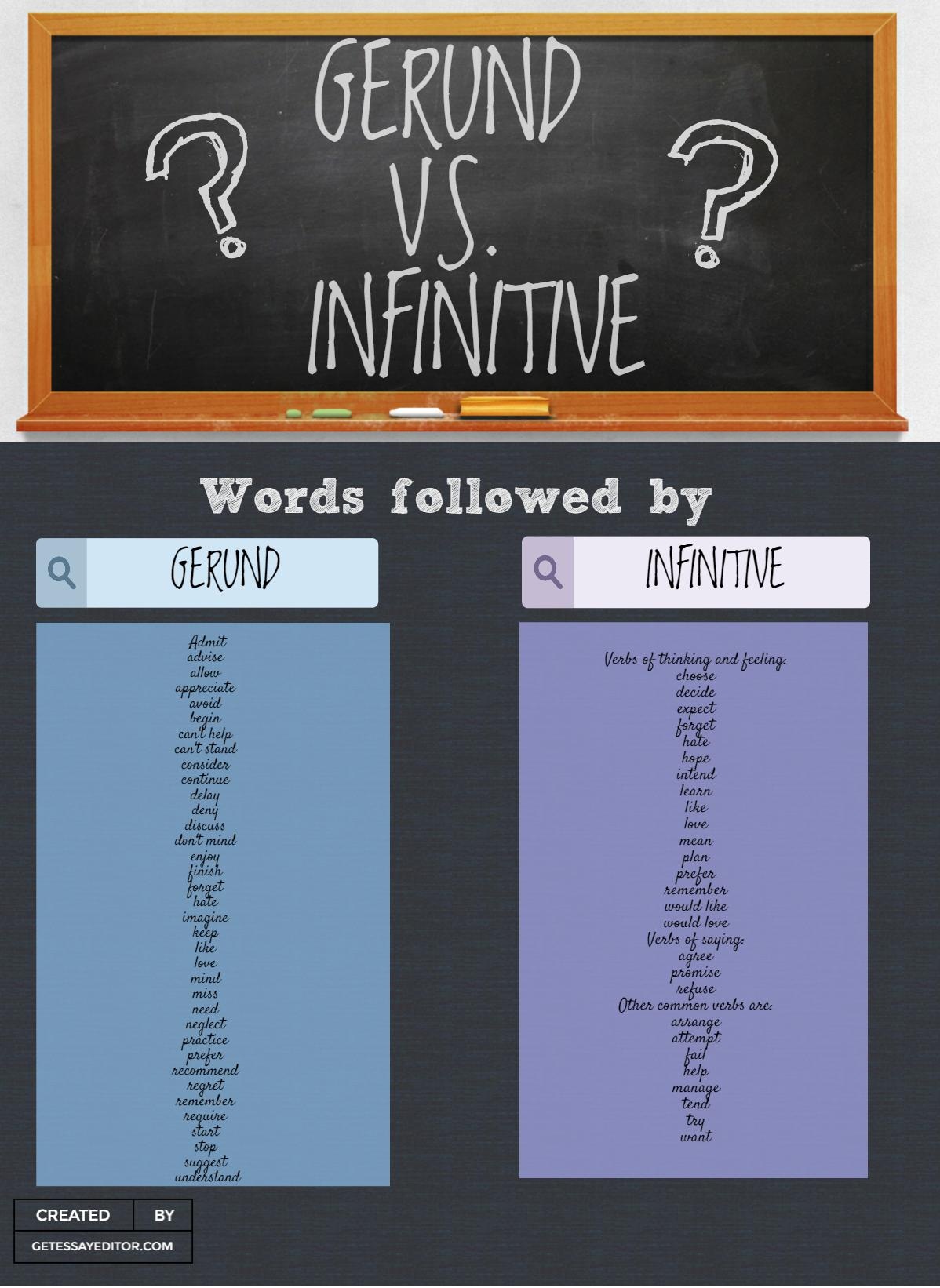Way to use gerund in English
Short overview
A gerund is a verbal that has an –ing ending and names the action. It also has characteristics of the noun, as well as the verb. Since gerund has all characteristics of the noun, as well as an infinitive, it performs a syntactical function of this part of speech in a sentence. Therefore, in a sentence gerund usually functions as:
- Subject (ex. “Dancing is her favorite exercise”)
- Subject Complements (ex. “I am fond of reading”)
- Object (ex. “Her greatest pleasure is playing guitar”)
Gerund, however, has more properties of the noun than the infinitive. Unlike the infinitive, it can be combined with prepositions and determined as a possessive pronoun or a noun in the possessive case:
“I think of going to Spain this summer.”
“We insist on their taking part in this TV Show.”
“Не objected to his son's going to Las Vegas.”
Verbal properties of the gerund, as well as other non-personal forms of the verb can be expressed as follows:
1. The Gerund may have a direct object:
“I remember reading this book.”
2. The gerund may be determined by an adverb:
“He likes reading aloud.”
3. The gerund has forms of time and voice. The gerund can be Active or Passive towards the Voice, and Indefinite or Perfect due to it’s Time.
For example:
Indefinite Gerund Active “reading, writing, moving”
Indefinite Gerund Passive “being read, being written, being moved”
Perfect Gerund Active “having read, having written, having moved”
Perfect Gerund Passive “having been read, having been written, having been moved”.
All forms mentioned above are also known as “simple ing-form (or simple gerund); passive gerund form; perfect passive gerund; perfect gerund form”.
The active gerund form and the passive gerund form usually serves to denote a simultaneous action with one that is expressed by the main verb. The perfect active gerund form and the perfect passive gerund denotes an action that precedes the main verb.
The use of the gerund after prepositions
The gerund is widely used after prepositions and serves as prepositional object. It stands after different adjectives, phrasal verbs or participles that require particular prepositions.
For example:
I am fond of cooking.
When do you think of moving to a new apartment?
Students succeeded in passing a very difficult examination.
We insisted on being informed by phone of the arrival of the bus.
He is proud of having won the first place in the championship in high jumps.
She was surprised at having been asked about John’s sister who was kidnapped.
- There is a list of verbs, adjectives and participles, after which the gerund is used as the prepositional complement:
to be disappointed at to be surprised at to prevent from
to consist in to persist in to result in
to spend in to succeed in to be engaged in
to be interested in to accuse of to approve (disapprove) of
to hear of to inform of to suspect of
to think of to be afraid of to be capable (incapable) of
to be fond of to be proud of to count on (upon)
to depend on (upon) to insist on to object to
to get used to
The gerund in the function attribute
When functioning as attribute, the gerund is often used with different prepositions, the most frequently with of.
For example:
There are different ways of solving this problem.
We discussed different methods of teaching English language.
Have you any reason for saying such a rude words?
We have no intention of ordering sandwiches with pork.
He has no objection to being sent there.
- There is a list of nouns, after which the gerund is often used as an attribute:
astonishment (at) disappointment (at) surprise (at)
apology (for) plan (for) preparation (for)
reason (for) experience (in) interest (in)
skill (in) art (of) chance, opportunity (of)
fear (of) habit (of) hope (of)
idea (of) importance (of) intention (of)
means (of) method (of) necessity (of)
pleasure (of) possibility (of) problem (of)
process (of) right (of) way (of) objection (to)
Gerund as adverbial modifier
In the function of adverbial modifier gerund is used:
1. With prepositions on (upon), after, before, in to indicate the time when the action is performed.
For example:
On finding that his wife was cheating with another man, he was forced to divorce.
After saying this he left the class.
Before leaving for homeland, he called her to say goodbye.
Before being sent to customers, the goods were sorted and packed.
2. With preposition by to indicate in what manner the action is carried out (how, with the help of what?).
For example:
Не improved his article by applying to professional editing services.
You will improve you dissertation by ordering professional help.
3. With prepositions besides, instead of, without, apart from to mark accompanying events.
For example:
Besides being smart, she is very beautiful.
Instead of writing the essay himself, he asked an expert writer to do it.
Не left the room without waiting for a reply.
4. With a compound prepositions for the purpose of, with the object of, with a view to to denote the purpose of an action.
For example:
The World Wide Fund for Nature has been established for the purpose of reducing the negative impact of the humanity on the nature.
5. With prepositions without, in case of, in the event of to denote conditions. It is used in formal writing the most frequently.
For example:
You will never speak good Spanish without learning grammar.

If you still have any questions concerning usage of Gerund in English language, feel free to comment or share your thoughts with us in Live Chat.
